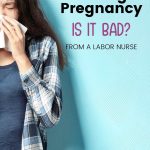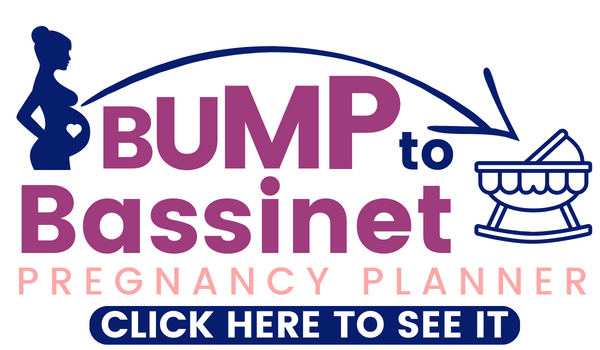Is it safe to sneeze during pregnancy? What are the risks? In this blog post, we will explore the possible risks associated with sneezing during the first trimester of pregnancy. We will also provide some tips on how to minimize these risks. Stay safe and healthy, everyone!
But first, how do I know all of this? Hi — I’m Hilary — The Pregnancy Nurse 👩⚕️. I have been a nurse since 1997 and I have 20 years of OB nursing experience, I am also the curly head behind Pulling Curls and The Online Prenatal Class for Couples. 🩺 I have seen LOTS of worried pregnant patients wondering if this or that is OK so I am a good resource to chat about this.
Grab my hospital checklist while you’re here!
And of course, before we get started please talk with your provider about your own circumstances and needs. You may have risks that other pregnant patients don’t have and would need to be addressed by them. This is just some general knowledge, not medical advice!
What is a sneeze?
First off, what is a sneeze? And frankly, can you even stop it?
A sneeze is a reflexive action that is caused by the stimulation of the nerves in the nose. When these nerves are stimulated, they send a signal to the brain which then triggers the musculature of the chest and abdomen to contract. This contraction results in a sudden burst of air being expelled from the lungs. The air that is expelled from the lungs is then directed out through the nose and mouth.
And guys — reflexive actions can’t always be stopped. And in a sneeze’s case it seems to always get out (or bug us for a while). So, while it’s important to talk about WHY you might sneeze a lot, and what to watch for — the reality is there isn’t a whole lot you can do to your body to stop it!
What are the causes of sneezing during pregnancy in the first trimester?
There are several possible causes of sneezing during pregnancy in the first trimester.
One of the most common is pregnancy rhinitis, which is nasal congestion that begins at any point during pregnancy and resolves within two weeks of your baby’s birth. This is thought to be caused by the hormonal changes that occur during pregnancy, which can cause the blood vessels in the nose to swell.
This is the same thing that may cause you to have bloody noses in early pregnancy.
This was an interesting study that showed 39% of pregnant people experience Rhinitis (although most of them experience it just outside the first trimester).
Another possible cause of sneezing during pregnancy is your body’s immune system. During pregnancy, your immune system is quick to respond to the harmful germs that cause sickness and disease. This can cause you to sneeze more often as your body tries to get rid of the offending germs.
It may also be the culprit behind your increased gag reflex and smelling things more than usual. Your body is trying to protect that baby from anything happening to you!
As with all people sneezing, it could also just be to regular seasonal allergies. This could definitely be the case if you get them more after being outside.
Some women report enhanced allergies during pregnancy and some report they decrease. But, allergies are something that you may be able to treat — but definitely talk with your provider before taking any medication.
What are the risks associated with sneezing during pregnancy?
In general, ESPECIALLY in the first trimester your body is equipped to manage sneezing. Now, other things that may come with sneezing could be problematic.
Things like:
Fever — can be a problem, especially in the first trimester, so if you have a fever be sure to contact your provider to see what you can do and if they’d like to see you.
Difficulty Breathing — Clearly, you and the baby need lots of oxygen during this pregnancy and any difficulty breathing can be bad. Make sure you talk with your provider (even just your general doctor is also fine) if you’re having any difficulty breathing at all!
While it is possible that the jarring motion of a large sneeze could be problematic for the baby, so could riding in the car, going on a walk, a bike ride, intimate time with a partner. It would be very rare.
How can you treat sneezing during pregnancy in the first trimester?
Heads up! 👀 There may be affiliate links in here – I might earn a smidge with your click. No cost to you, just good vibes! Check my boring stuff for deets.
There are several things you can do to treat sneezing during pregnancy in the first trimester. One of the most effective is to use a neti pot to clear out your sinuses with a saline solution or distilled water. This will help to reduce the inflammation in your nose and make it easier to breathe.
You can also use a saline nasal spray to clear out the sinuses. This will help to relieve the congestion and make it easier to breathe.
You could also try something like breathe strips that mechanically try to open your nose.
If you are having trouble breathing, you may want to consult with your doctor or midwife. They may recommend medication. However, you should always check with your healthcare provider before taking any medication, as some medications are not safe to take during pregnancy.
When should you see a doctor about your sneezing during pregnancy in the first trimester?
If you are having difficulty breathing, are experiencing severe sneezing, or have a fever, you should see your doctor or midwife right away. These could be signs of a more serious condition, such as a sinus infection.
If it feels like allergies and you’d like to see if you can take anything you could likely call into the office and they may have an answer for you, just by talking to the nurse.
However if you’re just noticing more sneezing than usual you can likely wait til’ your next prenatal appointment to talk to them about it.
How can you prevent sneezing during pregnancy in the first trimester?
There are several things you can do to prevent sneezing during pregnancy in the first trimester. One of the best things you can do is to practice good hygiene. This means washing your hands often, especially after you sneeze or blow your nose.
You should also avoid touching your face, as this can spread germs. If you must touch your face, be sure to wash your hands first.
It is also important to avoid exposure to irritants, such as smoke, dust, and pollen. If you are exposed to these things, be sure to take a shower and change your clothes as soon as possible.
You can also use something like the Neti Pot to wash away any allergens from your airways.
Finally, stay hydrated by drinking plenty of fluids. This will help to thin the mucus in your nose and make it easier to breathe.
Sneezing During Later Pregnancy
As I mentioned above, most women find that pregnancy rhinitis comes to a peak between 13-21 weeks, so it would be normal to feel this symptom past the first trimester.
Sneezing During the Second Trimester
Again, your body is well-equipped to keep baby in even with some jarring motions.
However, you may be able to take more medication if you believe that would help. And again, be sure to contact your provider before you take anything. And, be sure to contact them if you have a fever or any difficulty breathing.
Sneezing During the Third Trimester
This is when you might get ligament pain with sneezes. That is the ligaments (called round ligaments) that attach your uterus to your body getting so stretched. When you have all that pressure on your abdomen at once it can be really painful (often a sharper pain).
I recommend people wear a belly band, or belly straps to help support their uterus if they are sneezing a lot.
You can also hold a pillow over your belly to help support it during a sneeze as well.
And again, talk with your provider if sneezing comes on suddenly or if you have fever or difficulty breathing.
Sneezing during pregnancy in the first trimester is a common occurrence. However, there can be risks associated with it. Be sure to talk to your doctor or midwife if you are having difficulty breathing or if you have any other concerns.
Ok, so that’s sneezing during pregnancy.
Are you feeling overhwelmed with ALL there is to do with your pregnancy? Check out the Bump to Bassinet Pregnancy Planner:
And, if you’re not quite sure you’re ready for that whole thing, check out my free prenatal class. It’s your first step toward becoming your own birth boss.






 3 Ways to Prevent Birth Trauma: Make your birth amazing with a few mind shifts!
3 Ways to Prevent Birth Trauma: Make your birth amazing with a few mind shifts!
